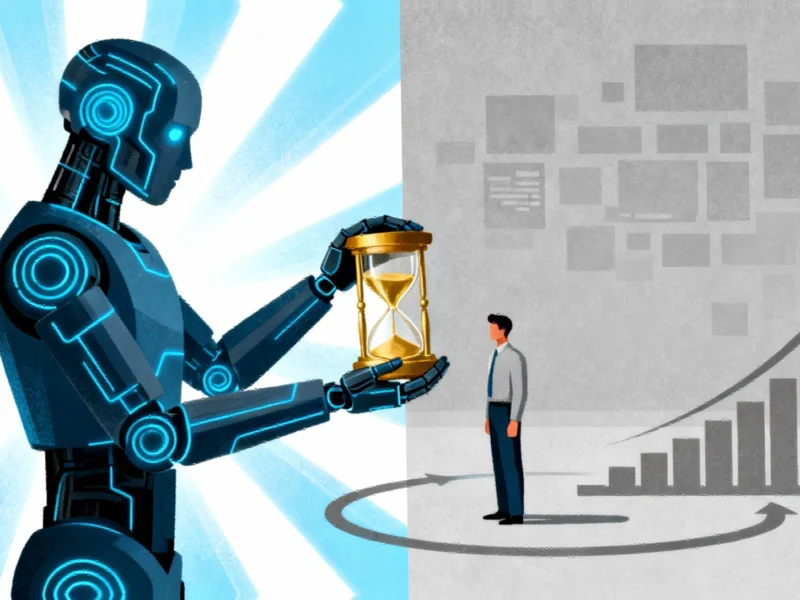The Efficiency Illusion: AI’s Unfulfilled Promise
While artificial intelligence is rapidly transforming workplaces worldwide, new research reveals a troubling disconnect between perceived efficiency and actual productivity gains. According to Adecco Group’s comprehensive Global Workforce of the Future report, employees using AI tools report saving an average of two hours daily, yet organizations are struggling to translate these time savings into measurable business impact.
The sixth edition of this landmark study, drawing from 37,500 workers across 31 countries and 21 industries, suggests that AI adoption has accelerated dramatically, but the promised productivity revolution remains elusive. “Technology in itself is not enough to drive change—people remain at the heart of every transformation,” emphasized Denis Machuel, CEO of the Adecco Group.
The Confidence Gap: Workers Lead, Employers Lag
Worker confidence in AI tools has surged dramatically, with 71% of respondents reporting no barriers to AI adoption compared to just 19% last year. However, this enthusiasm contrasts sharply with organizational readiness. Only 32% of employees believe their employers are keeping pace with AI advancements, creating a significant confidence gap in leadership’s ability to harness technological potential.
This technological transformation is reshaping entry-level opportunities across the tech workforce, creating new pathways while eliminating traditional roles. The rapid evolution demands that companies rethink their approach to talent development and skill acquisition.
Purpose vs. Security: The Shifting Workforce Priorities
In the UK and Ireland, three-quarters of workers now prioritize job stability over meaningful work—a significant increase from previous years that Adecco terms “job hugging.” This trend reflects ongoing economic uncertainty and suggests workers are increasingly valuing security even at the expense of purpose.
Yet purpose remains a powerful retention driver. Globally, 99% of employees who feel a strong sense of purpose plan to stay with their employer over the next year, compared to just 53% who lack this connection. This paradox highlights the complex emotional landscape employers must navigate in the AI era.
The Infrastructure Challenge: Beyond Technology Implementation
The report identifies several critical barriers preventing AI time savings from translating into productivity gains. Much of the saved time is being spent on routine tasks rather than high-value work, and organizations lack the structural frameworks to capture and redirect these efficiencies. Similar challenges are emerging across industrial sectors implementing long-term technology partnerships, where infrastructure investments must align with workforce capabilities.
Technical foundations also play a crucial role, as evidenced by recent improvements in Linux cryptography performance that enable more secure and efficient AI operations. These underlying technological advancements create the bedrock upon which productive AI applications can be built.
Building the Future-Ready Workforce
The number of “future-ready” workers—those proactively learning new skills—has more than tripled to 37% this year from 11% last year. This positive evolution suggests workers recognize the imperative of continuous learning, but organizations must provide structured support.
“Future-ready workers thrive when they have clarity, measurable goals, and continuous learning opportunities,” commented Daniela Seabrook, Adecco’s Chief HR Officer. “Employers must provide the right tools, training, and ethical frameworks so that AI becomes a driver of growth and human potential—not a source of uncertainty.”
Trust and Transparency: The Human Elements AI Can’t Replace
Despite AI’s growing influence, human connection remains imperative to job satisfaction. Privacy concerns regarding AI implementation have climbed to 44%, indicating a pressing need for greater transparency in how organizations deploy and manage AI systems. These concerns mirror broader industry developments in data governance and user trust.
The consequences of inadequate oversight are becoming increasingly apparent, as recent technology failures demonstrate how data integrity issues can undermine both productivity and trust. Organizations must balance innovation with responsibility to maintain workforce confidence.
Strategic Imperative: Aligning Technology with Human Potential
Adecco’s report concludes that AI adoption is no longer optional but represents a strategic imperative for competitive organizations. However, sustainable productivity gains will depend on how well companies align technological capabilities with human needs through communication, governance, and continuous learning.
The findings underscore what recent analysis confirms about AI productivity challenges: that meaningful transformation requires integrating technological innovation with human empathy. The most successful organizations will be those that view AI not as a replacement for human workers, but as an amplifier of human potential.
As organizations navigate this complex landscape, they must recognize that the ultimate measure of AI success isn’t time saved, but value created—for both the business and the people who power it. The companies that master this balance will lead the next wave of related innovations in workforce productivity and engagement.
This article aggregates information from publicly available sources. All trademarks and copyrights belong to their respective owners.



